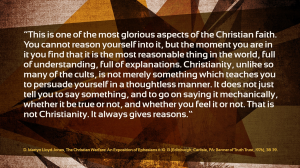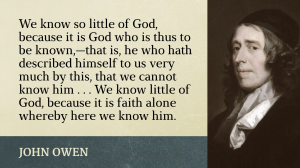
“
We are to put on the whole armour of God—for, or because, ‘we wrestle not’ etc. This is one of the most glorious aspects of the Christian faith. You cannot reason yourself into it, but the moment you are in it you find that it is the most reasonable thing in the world, full of understanding, full of explanations. Christianity, unlike so many of the cults, is not merely something which teaches you to persuade yourself in a thoughtless manner. It does not just tell you to say something, and to go on saying it mechanically, whether it be true or not, and whether you feel it or not. That is not Christianity. It always gives reasons.”
The Christian Warfare: An Exposition of Ephesians 6:10–13 (Edinburgh; Carlisle, PA: Banner of Truth Trust, 1976), 38–39.



